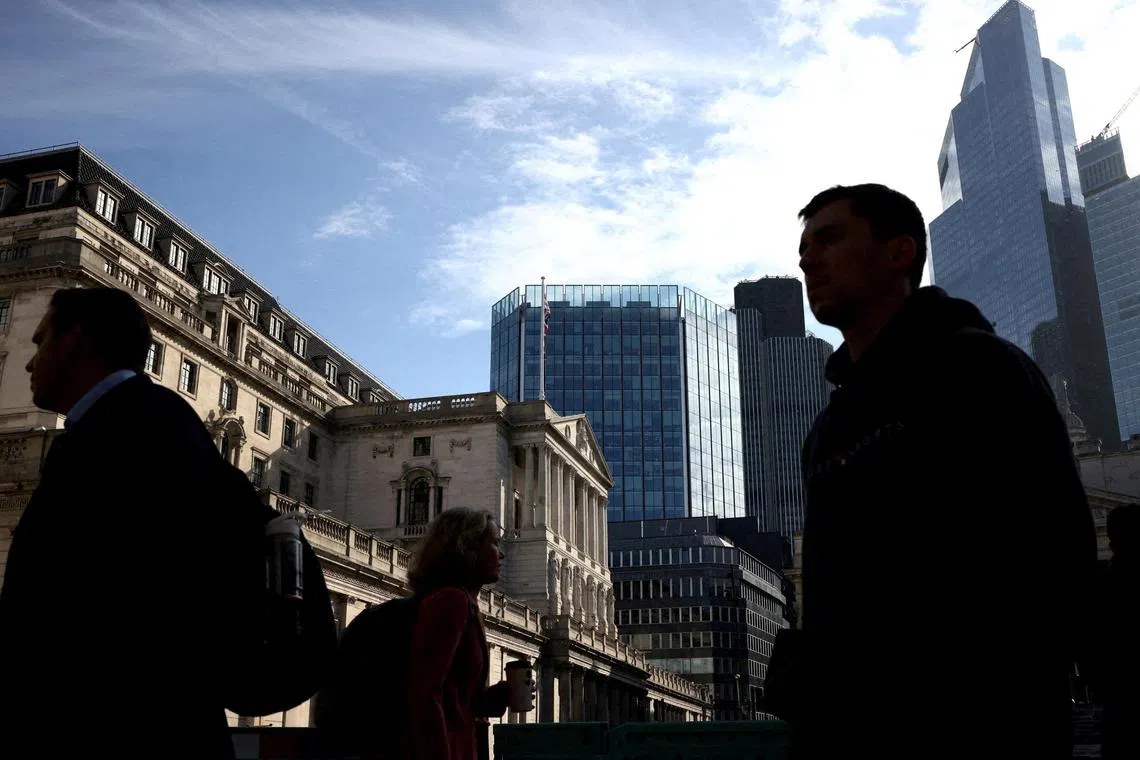Funds tracking Britain’s main stock index have an ESG problem
Sign up now: Get ST's newsletters delivered to your inbox

The London Stock Exchange is becoming an emblem of the UK's failure to keep pace with the US and the European Union.
PHOTO: REUTERS
LONDON - Funds tracking Britain’s main stock index are exposed to considerably more environmental and social harm than those following other major benchmarks in Western Europe.
That is according to a Bloomberg News analysis of figures compiled by Impact Cubed, a London-based environmental, social and governance (ESG) data provider.
Exchange-traded funds closely tracking the FTSE 100 are more than twice as exposed to greenhouse gas emissions as exchange-traded funds (ETF) tied to Germany’s DAX, the data show. The ratio rises to more than three for Europe’s benchmark Stoxx 600 and almost 12 when held up against the OMX in Sweden.
Once a powerful symbol of Britain’s free-market economy, the London Stock Exchange is instead becoming an emblem of the country’s failure to keep pace with the United States and the European Union in commercialising green technology and innovation.
For some ESG investors, that is making Britain less appealing than many other markets, as they hunt for stocks set to outperform in an age shaped by climate change and artificial intelligence.
“The FTSE 100 is a legacy index” filled with old-world stocks, according to Mr James Penny, a veteran ESG investor and chief investment officer at TAM Asset Management in London.
That “legacy” status has coincided with real underperformance. Stagnation in 2023 in Britain’s main benchmark for stocks compares with gains of around 8 per cent in Europe’s Stoxx 600 Index and 16 per cent in the MSCI World Index.
An analysis of ETFs and the benchmarks they track using the Impact Cubed data shows that exposure to fossil fuels makes up more than 20 per cent of the FTSE 100, compared with less than 3 per cent of the DAX and under 2 per cent of the OMX in Sweden. For Europe’s Stoxx 600 Index, the ratio is just over 10 per cent.
The FTSE 100 is also considerably worse, on average, than its European peers when it comes to exposure to things such as hazardous waste.
And companies in the British benchmark are more likely to tolerate a huge pay gap between chief executives and regular staff. Those earning the most at FTSE 100 companies make an average of 87.5 times the median annual total pay of the rest of their company’s employees, the data show.
Ms Laura Hoy, an ESG analyst at Hargreaves Lansdown, says investors will use this earnings season to scrutinise the FTSE 100’s “sin stocks”, whose commitment to ESG – or lack thereof – “will be on full display”, she said in an e-mail.
Shell will be “under the microscope” amid reports it is planning to retreat from its renewables business, Ms Hoy said. Others facing ESG investor scrutiny include Rio Tinto and British American Tobacco, she added.
An analysis by Impact Cubed shows that funds tracking the FTSE 100 would need to make significant adjustments to the index’s weightings to improve their ESG credentials. That includes slashing Shell’s weighting to about 3 per cent from its current level of roughly 8 per cent.
For some investors, the FTSE 100’s status as a laggard on a number of key ESG metrics has proved unacceptable. Earlier this year, the Oxfordshire branch of the Local Government Pension Scheme, which is overseen by the Pension Fund Committee, said it decided to reduce its allocation to the British market. The move was designed “in particular” to cut exposure “to the FTSE 100 companies that have links to major oil, gas and mining”, the group said.
Shell’s recent strategy pivot to downplay its focus on renewables and ratchet up spending on fossil fuels has angered ESG investors. Some, including the Church of England Pensions Board, have responded by blacklisting the company altogether.
Mr Jean-Philippe Hechel, a senior portfolio manager at Bank J Safra Sarasin, owns shares in just one British-listed firm – telecommunications carrier Vodafone Group – in the sustainable fund he runs.
“I’m very conscious in terms of the climate profile of the mining companies,” said Zurich-based Mr Hechel. “So for the moment, we have no exposure there.”
Britain is taking some steps to address concerns it is falling behind. London Stock Exchange Group’s FTSE Russell unit earlier in 2023 launched a new index series, which includes an ESG-adjusted variant of the flagship FTSE 100 gauge, among others.
“The UK has a phenomenal track record of innovation,” TAM’s Mr Penny said. “Some of the most widely used disruptive ideas across our entire planet’s history came from the UK.”
He added: “We’re still that innovative country, (but) we lack the architecture to bring it to market.” BLOOMBERG


